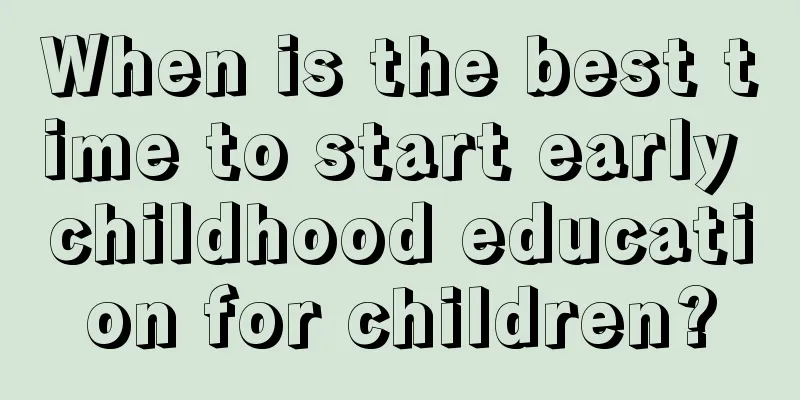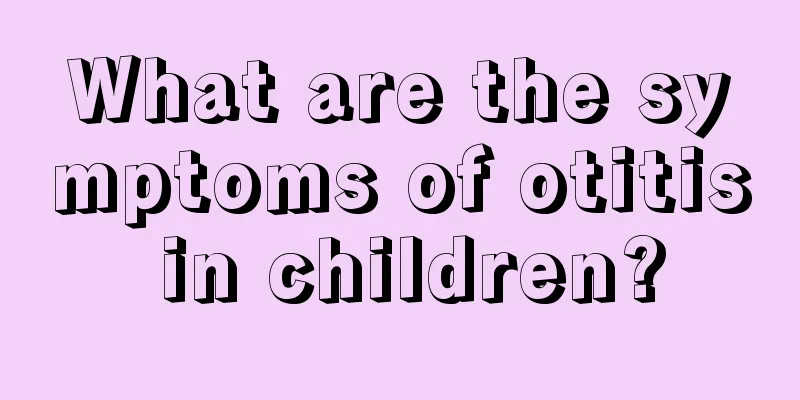When is the best time to start early childhood education for children?

|
The education of children is something that parents pay great attention to, because education is the foundation of cultivating a person. Good education can make children more mature and sensible, and the education of children must be started early to be effective. The phenomenon of early education has emerged in modern life. Let’s take a look at what is the best time for early education for children of certain ages. I hope everyone can understand it. 0-3 years old is the golden period for children’s brain development In our traditional concept, primary school is the beginning of formal education. The earliest period for children to start education is kindergarten, and kindergarten education usually starts at 3 to 4 years old. However, domestic and foreign studies on infants and young children have shown that starting children's education at 4 to 5 years old is too late. The golden period for children's brain development is 0-3 years old. Early childhood education: seize every opportunity anytime and anywhere Most parents think of early education as things like improving IQ and making their children smarter, but these ideas are too hasty and quick to achieve success. In fact, early education focuses more on the cultivation of behavior and character. Early education is an ongoing process. Its effects are often not immediate, but it gradually and subtly influences the child's behavior and character in a positive way. The period from birth to 3 years old is the fastest period of brain development. During this period, billions of brain cells and trillions of synapses connecting these brain cells develop rapidly. However, the brain cells and synapses of the human brain are not fixed structures. Every experience of a child, from a smile from a parent to a trip during infancy, will stimulate brain cells in a specific part of the body. Over time, brain cells that are repeatedly fired become more active, while those that are never fired are pruned away. This shows that a child's development is determined by the interaction between DNA (innate) and personal experience (acquired environment), and a child's early experiences depend entirely on how parents interact with their children and what kind of growth environment they provide for their children. A child's early experiences determine the development of four abilities throughout his or her life: motor skills, language skills, cognitive and learning skills, and social-emotional skills. Starting two months after birth, a child's brain begins to prepare to explore the world, and the part of the brain that controls motor and language abilities begins to develop. Starting from 6 months, the child's brain begins to develop the above four abilities simultaneously, and these four abilities are not independent of each other, but rather have an entwined relationship of "I within you, and I within you." |
<<: How to educate a six-year-old child
>>: What to do with a spoiled child
Recommend
What should I do if my baby has dry and hard stools and difficulty defecating?
The baby's stool is always very dry and hard,...
What to do if your 6-month-old baby has enteritis
Six-month-old babies are just beginning to eat co...
What are the taboos for babies to eat eels?
Yellow eel is a relatively good food. Although it...
What are the symptoms of colic in children?
Colic in children is actually a normal physiologi...
How to take care of a baby’s blocked nose?
It is easy for babies to have nasal congestion wh...
What to do if your child's fiber content exceeds the standard
The food or fruits we usually eat are rich in die...
What is the reason for a six-month-old baby to sweat?
Six-month-old babies sweating makes many new moth...
The best way to correct stuttering
There are many children who often imitate others ...
Baby head shape corrector
After a newborn is born, parents should prepare a...
What should I do if a male baby has scrotal fluid accumulation?
After the baby is born, some parents will find th...
Child spitting while sleeping
Many young parents will find that every time the ...
Symptoms and causes of baby eczema
Newborn babies need every possible care from thei...
Treatment of pneumonia in children
We all know that infants and young children are t...
What to do if your 4-month-old baby has a stuffy nose
Every change in the baby after birth is watched b...
What is a humeral fracture in children?
Children may suffer fractures if they are not car...









